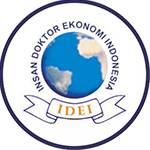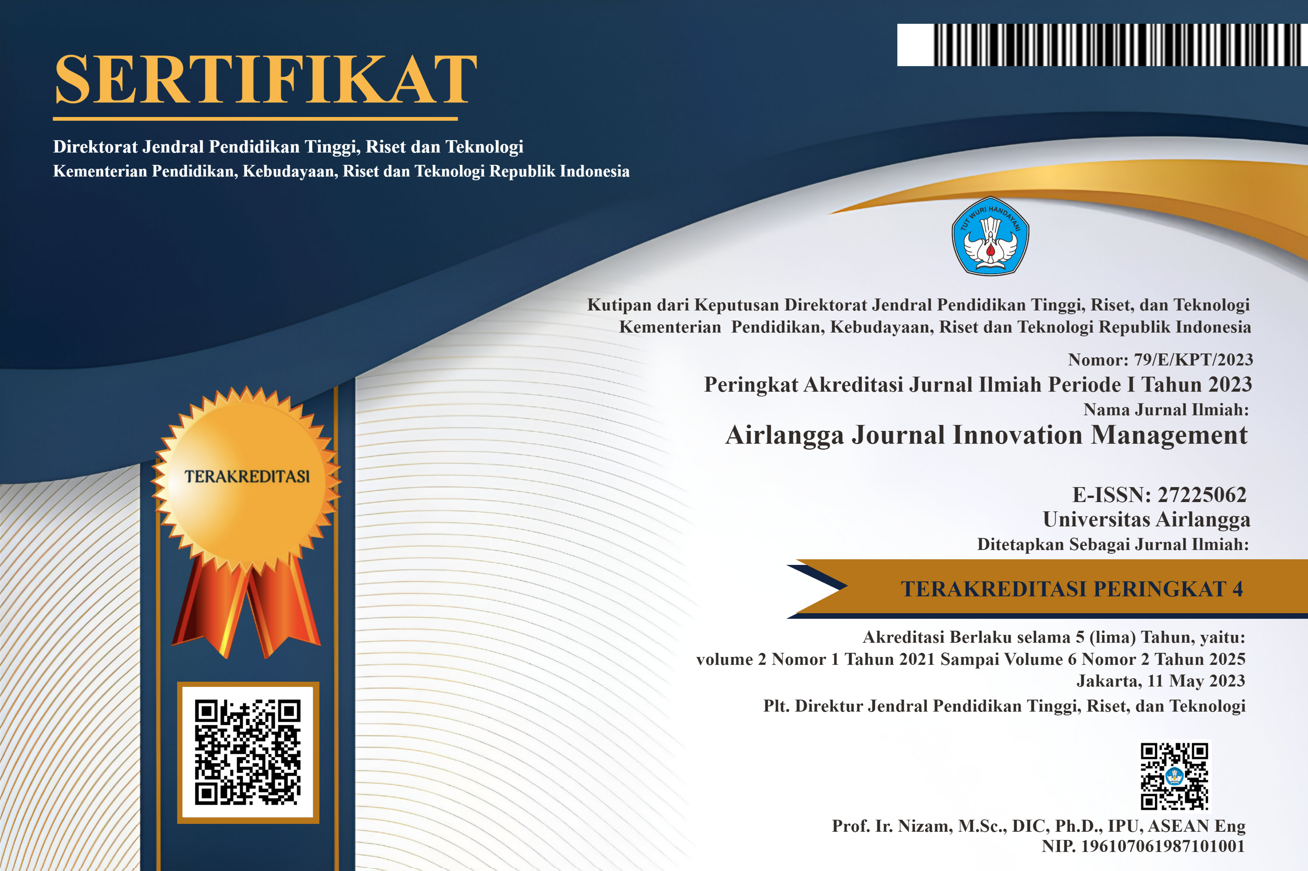The Effect of Profit-Sharing on Productivity of Micro, Small, and Medium Enterprises (MSME) in Indonesia
Downloads
Research on the effect of profit-sharing on large-scale enterprise productivity has been done in many countries. But previous study found an inconsistent results, that is profit sharing is not significantly influence productivity of MSMEs. This research aims to deepen more about the reason is this profit-sharing in its application have or don't have a significant impact in increasing productivity of Micro and Small Enterprises in Indonesia. The qualitative research method used in this research is through in-depth interview techniques to seven respondents who are MSME entrepreneurs in the manufacturing sector with product types that vary between respondents. The purpose of this interview is to gather information about the system of wages and distribution of bonuses in MSMEs, which have different characteristics from large industries in general. The interview results show that there is profit sharing in Indonesia MSMEs, but it is not considered as financial compensation or work bonus that leads to the next performance target. However, most of them interpreted as "kindness" from MSME owners in form of financial or non-financial benefits. This research brings research implication that profit sharing on MSMEs are unique and can be applied in many forms. Even though in previous quantitative study, profit sharing is stated as not significantly influence the MSMEs productivity and performance, In some cases, profit sharing is proven to increase the motivation and loyalty of employees.
Akerlof, G.A. (1982). Labor Contracts as Partial Gift Exchange. The Quarterly Journal of Economics, 97(4), 543-569.
Arrowsmith, J., Gilman, M.W., Edwards, P., & Ram, M. (2003). The Impact of Minimal Minimum Wage in Small Firms. British Journal of Industrial Relations, 41(3), 435-456.
Azfar, O & Danninger, S. (2001). Profit Sharing, Employment Stability and Wage Growth. ILR Review, 54(3), 619-630.
Badan Pusat Statistik. (2014). Profil Industri Mikro dan Kecil Tahun 2014. Jakarta : BPS.
Benjamin, N.C., & Mbaye, A.A. (2012). The Informal Sector, Productivity and Enforcement in West Africa : A Firm Level Analysis. Review of Development Economics, 16(4), 664-680.
Cahuc, P., & Dormont, B. (1997). Profit Sharing : Does It Increase Productivity and Employment? A Theoretical Model and Empirical Evidence on French Micro Data. Labour Economics, 4(1997), 293-319.
Ciancanelli, P., Gallhofer, S., Haslam, J., Watson, R. (1997). Profit Related Pay and Small Firm Labour Market. Small Business Economics, 9, 225-238.
Conte, M.A., & Svejnar, J. (1988). Productivity Effects of worker Participation in Management, Profit Sharing, Worker Ownership of Assets and Unionization in U.S Firms. International Journal of Industrial Organization, 6(1988), 139-151.
Cooke, W.N. (1994). Employee Participation Programs, Group-Based Incentives and Company Performance : A Union-Nonunion Comparison. Industrial and Labor Relations Review, 47(4), 594-609.
Danziger, L. (2010). Endogeneous Monopsony and The Perverse Effect of the Minimum Wage in Small Firms. Labour Economics, 17, 224-229.
Dixit, K., & Pal, R. (2010). The Impact of Group Incentives on Performance of Small Firms: Hausman-Taylor Estimates. Managerial and Decision Economics, 31(6), 403-414.
Gielen, A.C. (2011). Profit Sharing for Increased Training Investments. British Journal of Industrial Relations, 49(4), 643-665.
Hannan, R.L. (2005). The Combined Effect of Wages and Firm Profit on Employee Effort. The Accounting Review, 80(1), 167-188.
Harahap, M.K., Holomoan, A., Siregar, R.P., Siregar, R.S. (2021). The Influence of Compensation to Employee Performance in Food Security and Animal Husbandry Office. Airlangga Journal of Innovation Management, 2(2), 177-186.
Heywood, J.S., & Jirjahn, U. (2009). Profit Sharing and Firm Size: The Role of Team Production. Journal of Economic and Behavior and Organization, 71, 246-258.
ILO. (2005). World Employment Report 2004-2005. Employment, Productivity and Poverty Reduction. Geneva : International Labour Organization
ITC. (2016). Annual Report 2015: Trade Impact for Good. Geneva : International Trade Center.
Jones, D.C., & Kato, T. (1995). The Productivity Effect s of Employee Stock-Ownership Plans and Bonuses: Evidence from Japanese Panel Data. The American Economic Review, 85(3), 391-412.
Kruse, D.L. (1992). Profit Sharing and Productivity: Microeconomic Evidence from the United States. The Economic Journal, 102(410), 24-36.
Kruse, D.L. (1993). Does Profit Sharing Affect Productivity?. National Bureau of Economic Research Working Paper No.4542.
Mourougane, A. (2012). Promoting SME Development in Indonesia. OECD Economics Department Working Papers, No. 995. Paris: OECD Publishing.
Mukhopadhyay, A.K., & Pendhse, S. (1984). Profit-sharing in Small Business : An Analysis of Risk and Incentives Effects. Journal of Small Business Canada, 1(3), 9-14.
Ohkusa, Y & Ohtake, F. (1997). The Productivity Effects of Information Sharing, Profit Sharing and ESOPs. Journal of The Japanese and International Economies, 11, 385-402.
Poernamasari, D.W., & Damayanti, A. (2018). Pengaruh Profit Sharing Terhadap Produktivitas Usaha Mikro dan Kecil di Indonesia. Thesis : Universitas Indonesia.
Setiawan, N., Maisyarah, R., Harahap, R. (2020). Analysis Of Emotional Intelligence And Work Discipline On Employee Performance With Organizational Commitment As An Intervening Variable. Airlangga Journal of Innovation Management,, 1(2), 184-206.
Stein, H.D., & Ginevicius, R. (2010). Overview and Comparison of Profit Sharing in Different Business Collaboration Forms. Journal of Business Economics and Management, 11(3), 428-443.
Sugiyono. (2007). Metode Penelitian Kuantitatif Kualitatif dan R&D. Bandung : Alfabeta.
Sutopo, H.B. (2006). Metodologi Penelitian Kualitatif. Surakarta: Universitas Negeri Sebelas Maret.
Tambunan, T. (2006). SME Capacity Building in Indonesia. Kadin Indonesia-Jetro.
Weitzman, M.L., & Kruse, D.L. (1990). Profit Sharing and Productivity, in Paying for Productivity: A Look at The Evidence. Washington D.C: The Brookings Institution.
Copyright (c) 2023 Airlangga Journal of Innovation Management

This work is licensed under a Creative Commons Attribution-NonCommercial-ShareAlike 4.0 International License.
- The journal allows authors to hold copyright without restrictions and retain publication rights without restrictions. The author retains the copyright and grants the first publication rights to the journal, with his work simultaneously licensed under the Creative Commons Attribution-NonCommercial-ShareAlike 4.0 International License (CC BY-NC-SA). This license allows others to share the work with acknowledgment of authorship and initial publication in this journal, provided that the work is not used for commercial purposes and that any derivative works must use the same license.
- Authors may enter into additional contractual agreements for non-exclusive distribution of the journal publication version (e.g., uploading it to an institutional repository or publishing it in book form), while still including acknowledgment of the initial publication in this journal.
- Authors are allowed and encouraged to upload their work online (e.g., in an institutional repository or personal website) before and during the submission process. This can support productive scientific exchanges as well as increase citations to published works.

AJIM by UNAIR is licensed under a Creative Commons Attribution-NonCommercial-ShareAlike 4.0 International License.





















